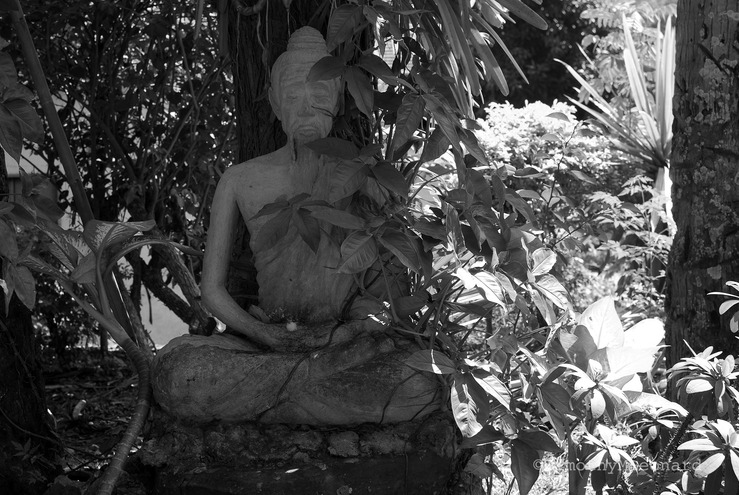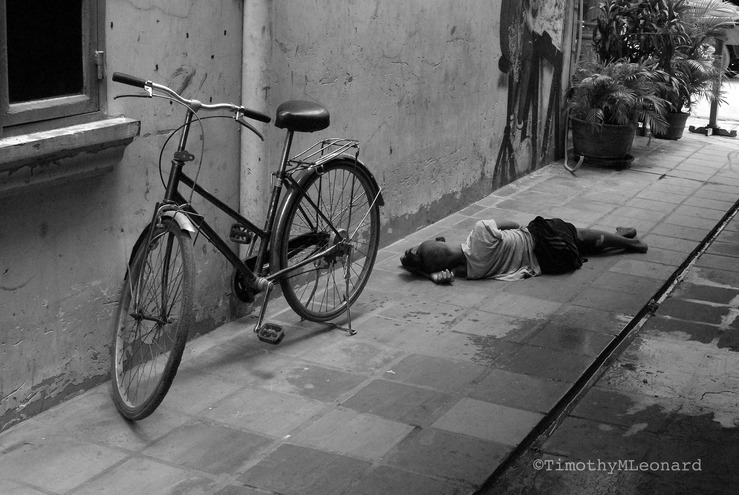Chapter 19.
At that moment following a 90-minute chakra body massage in Luang Prabang, a Disneyland of world heritage culture filled with French and German and Italian babbling idiots staggering on medical canes while craning arthritic necks toward cold European winter memories and grasping creased maps filled with blood red dots depicting guesthouses and casinos featuring obsessive oval tongued storytellers without maps, canes, awkward packs, widows, orphans, or land mine survivors piloting bomb boats down the Nam Ou river and recycling Grade A ordinance, a foreigner put a pile of gold on a table in Laos. He turned to a one-eyed squinting old man. “I will give you this pile of gold for your daughter.”
“I want more,” said the man. “Her face and body and heart are Lao. She has Vietnamese blood. It’s supply and demand. Business is business. Politics is business and business is politics. It’s all about value. No plastic. Cash only. See this machete?” waving it in the man’s face, cutting him off.
Nearby, two American males hadn’t decompressed. Trying to communicate in complete sentences was impossible. One released sounds, nouns, impressive words, past and present participles, guttural phrases, heavy deep real sentences and, like a game of chess, war or blind love showing no respect, the OTHER cut him off at the throat with a sharp sophisticated verbal annunciated machete.
Frustrated and grimacing, he suffered severe irreparable brain damage. Short circuit. Transmission lines went down. Thud. Crash. Burn.
The two Yankees were fresh off the banana boat. They’d sailed out of NY, past the oxidized tall green torch lady, diverted through the Suez Canal, picked up palm oil in Goa, and translated the lack of wind into thermal icecaps near Ceylon surveying tea plantations harvesting vast green high grade qualities of pure logic in a scientifically approved coherent genesis. The ship’s captain texted his mistress in Kuala Lumpur, “I’ll be late for dinner.”

She was engaged to a dour celibate hypocritical monk disguised as a novice meditating in an isolated cave on the Tibet-Bhutan border at 21,451 feet. She missed his calm sense of (purpose) intention and clear motivation. She prayed he’d complete his destiny to be One With Everything, leave the cave and travel south living fearless inside fatigued winds to meet her at an undisclosed location. This was her secret desire, wish, dream and consistent memory.
She imagined him bargaining his flesh-covered skeleton in a brief temporary life condition. He negotiated passage using Sumerian script etched on clay tablets. Brushing shard dust off shard dust revealed time-lines, sharp indentations, incomplete circles, zigzag lightning bolts and fingerprints of whirling dervish dancers.
Whorls reflected afternoon light into somnambulistic retinas.
A middle aged male Laotian dwarf in a well cut gray suit coat, black baggy pants and sturdy green army issued tennis shoes walked past. Pink sky streaked sunset. He’d been walking all day. His stride was steady. Other than a bowl of noodles near the Mekong he’d been raising dust. He was headed home, passing golden Wats, shimmering pots of food cooking on clay burners fired by kindling, blaring TVs, noisy greasy engine repair shops, bamboo pavilions and a sleeping tuk-tuk driver.
He passed a teashop chalk sign:
Smile. We Will Help You Practice.
He walked across a narrow red iron bridge above a river and down a dusty road to his bamboo home complete with a single watt bulb surrounded by dancing omnivorous insects.
His shoes went near the door. Slapping his jacket against a wall released day’s dust. He hung it up. He splashed water on his face and smiled at his incomplete reflection. He poured a cup of green tea, ate a handful of sticky rice and prepared his table.
He spread out a large sheet of rough handmade beige paper, camelhair brushes and black ink.
Memory spoke: After they cut my tongue out during my Re-education through shit labor experience I started writing script. I found a compressed black Chinese ink stick with yellow dragons breathing fire.
I added a little water to a recessed gray stone surface. I placed the ink in the center. Then, using my right hand, as Master Liu in Chengdu taught me, I rotated the stick in a clockwise motion. Black ink ebbed into liquid as a drop of water rippled a pond.
After collecting ink I picked up my long thick brown brush with white wolf hair. After soaking it in water for three minutes to relax it’s inner tension I spread out thin delicate paper. I placed my right foot at an angle, left foot straight, with my left palm flat on the table and fingers spread.
I dipped the brush in the recessed part of the stone to absorb ink and slowly dragged it along an edge removing excess. I savored the weight and heft. My brush has it own personality and character. There are 5,000 characters in my written language.
My Chinese script is about unity of mind and spirit. I have much to see and a long way to travel with this unknowing truth. I know what I don’t know. I don’t know what I know. The more I see the less I know.
My teacher recited a poem.
A mountain loses its spirit without cloud,
loses its peculiarity without stones,
loses its elegance without trees,
and loses its life without water,
and in painting,
one should concentrate the mind,
and hold the breath,
with concentration of the mind,
serenity is maintained, with the breath held up,
preciseness is attained.
One should be as serene as an old monk in meditation and be as precise as a silk worm in spitting silk.
The spirit and real fun of painting are from nature and beyond brushes and paints.
I stood up straight, took three deep breaths and exhaled into emptiness. I centered my unconscious on the blank paper filled with nothing. Respect the white emptiness.
My wisdom mind of intent became water. It was quiet, calm and still with concentration and focus. I listened to brush, ink and paper. I am a conduit. Be the brush, be the ink, be the water, be the paper.
Each essence is pure, free, clear and luminous.
My useless tongue flapped like a prayer flag in Himalayan winds. Stories and songs are nightingales. I heard children laughing and singing. They greeted each other in the babble of playful nothing with laughing word pearls.
They dream with their eyes open. When we are asleep we are awake.
Life gave me art and I used art to celebrate life.
Ice Girl in Banlung








 Share Article
Share Article 



